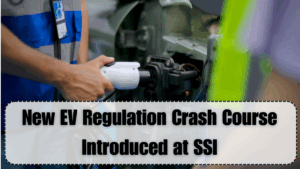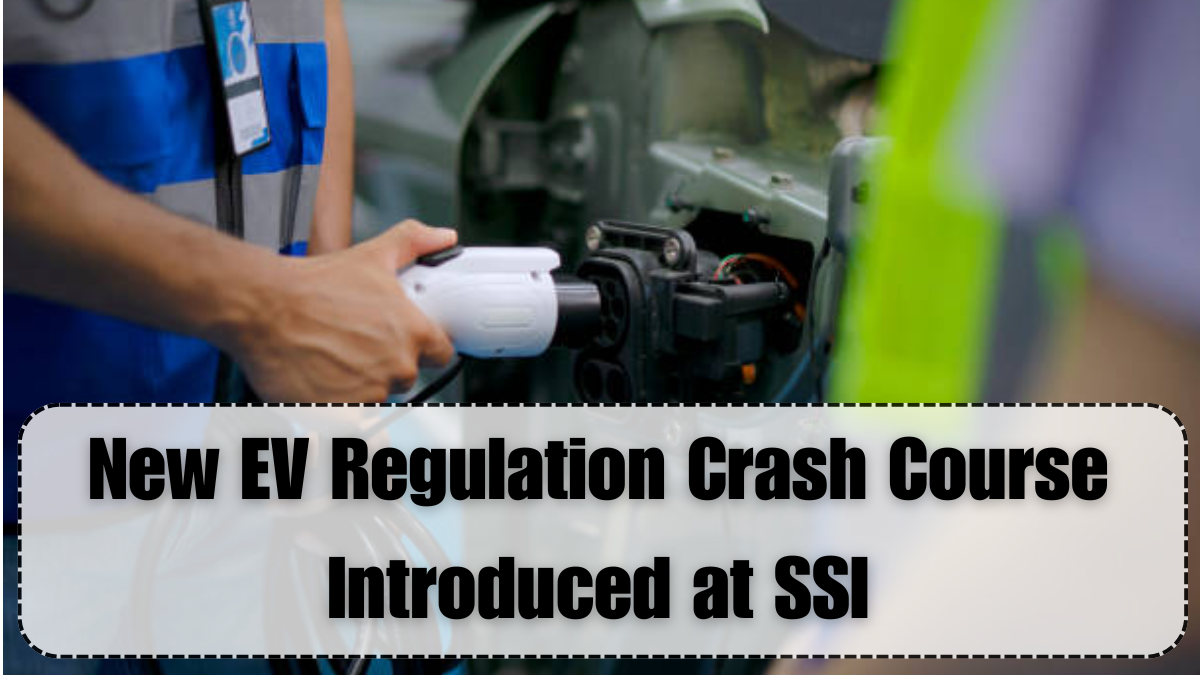EV regulation crash course is now officially part of the academic offering at SSI Polytechnic Institute, marking a major milestone in educating students about India’s evolving electric mobility laws. This course is designed to help future engineers, entrepreneurs, and policymakers understand the legal framework surrounding electric vehicles—from registration norms and emission rules to subsidy eligibility and industry compliance.
Launched as part of the institute’s extended certification curriculum, the EV regulation crash course is being taught through live workshops, case studies, and expert-led sessions. It targets final-year diploma students and those pursuing entrepreneurship or employment in the EV manufacturing and servicing sectors. By decoding complex legal documents and policies into understandable formats, the course makes EV regulation accessible and actionable for young professionals.

Decoding the Legal Side of Electric Mobility
India’s electric vehicle ecosystem is governed by a range of regulations issued by the Ministry of Road Transport & Highways, Central Pollution Control Board (CPCB), and other state-level authorities. This student course simplifies those regulations and teaches students how to apply them in real-world contexts.
Key topics covered include:
-
FAME-II scheme guidelines and eligibility
-
Battery safety standards and manufacturer compliance
-
Vehicle registration norms for EVs and hybrids
-
Homologation rules for two-, three-, and four-wheelers
-
Import duties, GST rates, and subsidy claims
The course also dives into the differences between state EV policies, highlighting how each region incentivizes production and adoption.
Real-Time Policy Learning in the Classroom
The highlight of the EV regulation crash course is its case-based format. Instead of memorizing rules, students engage with real-world examples—such as how a startup can qualify for battery-swapping infrastructure subsidies, or how emission certificates apply to e-rickshaws under local pollution boards.
Each session is supported by:
-
Policy briefs and government circulars
-
Legal document walkthroughs
-
Discussions on real regulatory violations and penalties
-
Live quizzes based on recent EV updates
This format ensures that student course participants understand the “why” and “how” behind every rule, making them better prepared for both compliance and innovation.
Preparing Students for Real-World Implementation
The EV regulation crash course is especially valuable for students planning to work in roles like EV plant operations, vehicle certification, business development, and after-sales service compliance. SSI provides mock regulatory audits, where students play the role of auditors or applicants for EV product approvals.
This active learning approach helps students gain skills in:
-
Drafting compliance documentation
-
Conducting pre-certification checks
-
Applying for registration of retrofitted EVs
-
Evaluating the legality of imported EV components
Such practical knowledge gives students a competitive advantage in a sector where regulatory clarity is as important as technical skill.
Industry Collaboration and Certification
The course has been developed with input from legal advisors and compliance officers from leading EV startups. SSI has signed an MoU with an EV legal consultancy to provide live guest lectures and offer top-performing students internship opportunities.
Upon completion, students receive an industry-recognized certificate stating their proficiency in EV regulation, emissions compliance, and policy interpretation. The course is now being considered for adoption by other student course programs across technical colleges in the region.
FAQs
What is the EV regulation crash course at SSI?
It’s a short-term, intensive course that teaches diploma students the legal and compliance framework for electric vehicles in India.
Who can enroll in this student course?
Final-year diploma students, engineering aspirants, and future entrepreneurs looking to work in EV production, servicing, or sales.
What does the course cover?
It includes government EV policies, battery safety laws, emission rules, registration norms, import duties, and subsidy claim procedures.
Is the course theory-based or hands-on?
The course uses case studies, quizzes, role-plays, and legal document walkthroughs to ensure hands-on, real-world understanding of EV regulation.
Does the course offer certification?
Yes, all students receive a completion certificate recognized by EV compliance experts and startup ecosystem partners.
Click here to know more.




